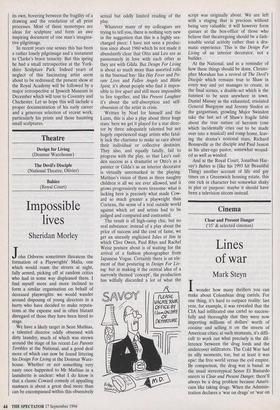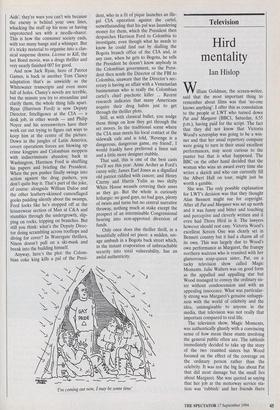Cinema
Clear and Present Danger (`15' & selected cinemas)
Lines of war
Mark Steyn
Iwonder how many thrillers you can make about Colombian drug cartels. For one thing, it's hard to outpace reality: last year, for example, it was revealed that the CIA had infiltrated one cartel so success- fully and thoroughly that they were now importing millions of dollars' worth of cocaine and selling it on the streets of American cities; at such moments, it's diffi- cult to work out what precisely is the dif- ference between the drug lords and the undercover infiltrators, The Cold War had its silly moments, too, but at least it was epic: the free world versus the evil empire. By comparison, the drug war is banal: as the usual stereotypical Senor El Bastard° sneers in Clear and Present Danger, there'll always be a drug problem because Ameri- cans like taking drugs. When the Adminis- tration declares a 'war on drugs' or 'war on Aids', they're wars you can't win because the enemy is behind your own lines, whacking the stuff up his nose or having unprotected sex with a needle-sharer. This is how the consumer society ends, with too many bangs and a whimper. But it's tricky material to organise into a clas- sical suspense drama. License to Kill, the last Bond movie, was a drugs thriller and very nearly finished 007 for good.
And now Jack Ryan, hero of Patriot Games, is back in another Tom Clancy adaptation that's as unwieldy as the Whitewater transcripts and even more full of holes. Clancy's novels are terrible, but the minute you try to streamline and clarify them, the whole thing falls apart. Ryan (Harrison Ford) is now Deputy Director, Intelligence at the CIA — a desk job, in other words — and Philip Noyce and his screenwriters have their work cut out trying to figure out ways to keep him at the centre of the picture. Down in the jungles of Latin America, covert operations forces are blowing up crime kingpins and Colombian moppets with indiscriminate abandon; back in Washington, Harrison Ford is shuffling his papers and briefing the President. When the pen pusher finally swings into action against the drug pushers, you don't quite buy it. That's part of the joke, of course: alongside William Dafoe and the other leathery-skinned camouflaged gooks padding silently about the swamps, Ford looks like he's stopped off at the leisurewear section of Man at C&A and stumbles through the undergrowth, slip- ping on rocks, tripping on branches. But still you think: what's the Deputy Direc- tor doing scrambling across rooftops and diving for cover? In Watergate thrillers, Nixon doesn't pull on a ski-mask and break into the building himself.
Anyway, here's the plot: the Colom- bian coke king kills a pal of the Presi- dent, who in a fit of pique launches an ille gal CIA operation against the cartel, notwithstanding that his pal was laundering money for them, which the President then despatches Harrison Ford to Colombia to investigate, even though what he needs to know he could find out by dialling the Bogota branch office of the CIA and, in any case, when he gets to Bogota, he tells the President he doesn't know anybody in the Colombian government, so the Presi- dent then sends the Director of the FBI to Colombia, unaware that the Director's sec- retary is having an affair with a Venezuelan businessman who is really the Colombian cartel's chief psychotic killer ... Recent research indicates that many Americans acquire their drug habits just to get through the thriller plots. Still, as with classical ballet, you nudge these things on how they get through the set moves. In the traditional scene where the CIA man meets his local contact at the sidewalk cafe and is told, 'Revenge is a dangerous, dangerous game, my friend', I would frankly have preferred a linen suit and a little more designer stubble.
That said, this is one of the best casts you'll see this year: Anne Archer as Ford's canny wife; James Earl Jones as a dignified old patriot riddled with cancer; and Henry Czerny and Harris Yulin as two shifty White House weasels covering their asses as they go. But the whole is curiously lethargic: no good guys, no bad guys, plenty of twists and turns but no central narrative thruway, nothing much at stake except the prospect of an interminable Congressional hearing into non-approved diversion of funds.
Only once does this thriller thrill, in a beautifully edited set piece: a sudden, sav- age ambush in a Bogota back street which, in the instant evaporation of unbreachable security into total vulnerability, has an awful authenticity.
'I'm coining out 110W, I may he some time'



























































 Previous page
Previous page